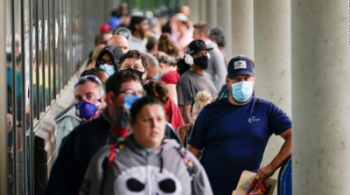

To save the US economy, we need to save jobs. This program could do that
 Upper advanced
Upper advanced
By Gogo
2020/07/07 15:00
1. resurgence (n.)
a new increase of activity or interest in a particular subject or idea that had been forgotten for some time
2. resume (v.)
If an activity resumes, or if you resume it, it starts again after a pause.
3. element (n.)
a part of something
4. ignominious (adj.)
(especially of events or behaviour) embarrassing because of being a complete failure
5. implement (v.)
to start using a plan or system
6. gear (v.)
to prepare for something that you have to do, or to prepare someone else for something
7. creaky (adj.)
used to describe something that is old-fashioned and not now effective
8. furlough (v.)
to allow or force someone to be absent temporarily from work
9. impede (v.)
to make it more difficult for something to happen or more difficult for someone to do something
10. advocate(n.)
someone who publicly supports something
To save the US economy, we need to save jobs. This program could do that

Nearly one-third of American workers have taken direct financial hits from the Covid-19 pandemic through lost jobs, lost hours, or pay cuts. And the resurgence of infections is causing businesses to shut down again in many parts of the country. It seems likely the job losses will resume unless Congress and the administration act quickly to provide substantially more financial support to businesses and households.
Lawmakers must rethink how they provide this help to address a critical element missing from the policy response thus far: restoring and preserving jobs.
We know such policies preserve jobs because they have done so in other countries. Indeed, the United States has the ignominious distinction of suffering the largest increase in unemployment of any major economy. Countries such as Germany and Australia that have implemented employee retention programs have suffered increases in unemployment that are about half that of the United States. Only here in the US is policy not geared to keeping workers out of joblessness — and all the disruption and financial stress that entails.
Enabling firms to pay their employees allows working families to efficiently receive the financial support they need. This would reduce pressure on the nation’s creaky unemployment insurance system and allow workers to remain on or return to their employer-sponsored health plans.
Keeping workers connected to their employers facilitates a smoother and stronger recovery. Many employers have furloughed workers, but the longer the crisis lasts, the more those furloughs will turn into layoffs and break the relationship between employers and workers. Moreover, without support, business bankruptcies and failures could be widespread enough to impede the economic recovery, which happened during the financial crisis. Many workers who think they will return to their employer won’t have an employer to go back to.
Covid-19 infections have reignited as businesses reopened too quickly in many parts of the country. The risk now is the economy will backslide, suffering long-lasting double-digit unemployment. Whether it does depends on the decisions Congress and the administration make in the next few weeks. Adopting employee retention policies, which have advocates on both the left and the right, would ensure that it doesn’t.

1. What to do if you were employed and have lost your job
2. Can government help the unemployed find work?
3. Does your country have many people losing a job because of coronavirus?
4. How do you comfort a man who lost his job?
“The problem suggests the solution.”
Tom Payne
“Unemployment is not the end of your life. It is the beginning of a bright future. “For I know the thoughts that I think toward you, saith the Lord, thoughts of peace, and not of evil, to give you an expected end.” Jeremiah 29:11.”
Charleen Goombs



